Moving from shared past through shared present on to shared future is a way for the countries of the Eastern Partnership to become stronger and more vocal in relations with their Western partners. Ways to leverage the synergy were discussed during the EaP Think Bridge round table on 14 June, 2017 in Yerevan, Armenia.
Diverse development, common challenges
The round table is one from the series of events aimed at building intellectual bridging between the countries of the region.
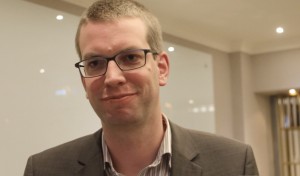 — Eastern Partnership is a very diverse region, with very different countries, challenges, mentalities and political systems. But discussions like this are important because it is surprising to find out how much they still have in common. And for us it is important to support the debate on how to overcome these common challenges, — said Felix Hett, Director of Friedrich-Ebert-Stiftung office “South Caucasus”, while opening the event.
— Eastern Partnership is a very diverse region, with very different countries, challenges, mentalities and political systems. But discussions like this are important because it is surprising to find out how much they still have in common. And for us it is important to support the debate on how to overcome these common challenges, — said Felix Hett, Director of Friedrich-Ebert-Stiftung office “South Caucasus”, while opening the event.
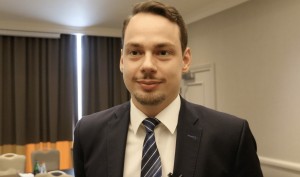 — All Eastern Partnership countries have their bilateral relations with Brussels. But the political dialogue between the countries is underdeveloped. They don’t have enough direct information exchange with each other. There are countries in the region that don’t even have embassies of each other. That is a so called information gap that we try to break by providing of the first-hand information from progressive and well-known think tanks, — added Marcel Röthig, Director of the Regional Office “Dialogue Eastern Europe” at Friedrich-Ebert-Stiftung.
— All Eastern Partnership countries have their bilateral relations with Brussels. But the political dialogue between the countries is underdeveloped. They don’t have enough direct information exchange with each other. There are countries in the region that don’t even have embassies of each other. That is a so called information gap that we try to break by providing of the first-hand information from progressive and well-known think tanks, — added Marcel Röthig, Director of the Regional Office “Dialogue Eastern Europe” at Friedrich-Ebert-Stiftung.
From civil society actors to change actors
In order to both bolster democratic institutions and pursue “good governance”, engagement in the public policy process is an essential prerequisite. During the event the experts shared the country-specific examples of the successes and failures of such public policy engagement.
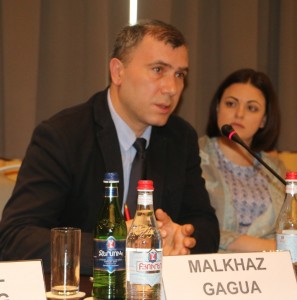 — Georgia was praised for the democratic reforms. But not everyone knows that they’ve come at a cost of a constant struggle between the democratic forces and the ones that look backward to the Soviet past. The Georgian civil society has always been a flagship of the democratic changes in the country. In all recent developments it was the civil society along with media who played a crucial role. The level of support and trust that people have for the civil society leaders is reflected in the fact that about two dozens of them are now represented in the parliament, — told Malkhaz Gagua, “Liberal Academy Tbilisi” Fund (Tbilisi, Georgia).
— Georgia was praised for the democratic reforms. But not everyone knows that they’ve come at a cost of a constant struggle between the democratic forces and the ones that look backward to the Soviet past. The Georgian civil society has always been a flagship of the democratic changes in the country. In all recent developments it was the civil society along with media who played a crucial role. The level of support and trust that people have for the civil society leaders is reflected in the fact that about two dozens of them are now represented in the parliament, — told Malkhaz Gagua, “Liberal Academy Tbilisi” Fund (Tbilisi, Georgia).
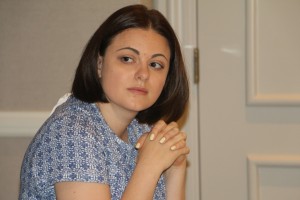 — Moldova is facing the situation when the civil society has less freedom to participate in the policymaking process as the country is highly politicized. That is highly dangerous as the civil society has to monitor the government, and note when the authorities cross the line. The Eastern Partnership countries have many positive cases of such civil participation, and need to share them with each other to find some common solutions for the common threats, — continued Victoria Bucataru, Executive Director, Foreign Policy Association of Moldova (Chisinau, Moldova).
— Moldova is facing the situation when the civil society has less freedom to participate in the policymaking process as the country is highly politicized. That is highly dangerous as the civil society has to monitor the government, and note when the authorities cross the line. The Eastern Partnership countries have many positive cases of such civil participation, and need to share them with each other to find some common solutions for the common threats, — continued Victoria Bucataru, Executive Director, Foreign Policy Association of Moldova (Chisinau, Moldova).
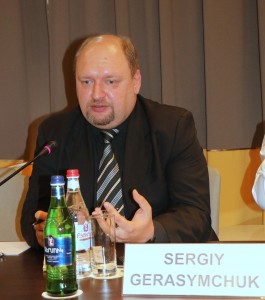 — Transformation of the civil society actors into the change actors is the case in Ukraine, Georgia, and Moldova already. And we do believe that if we continue our efforts on cooperation, if we try to promote the solidarity between the civil societies in our countries, then our voice within the EU, our voice vis-a-vis Russia will be much stronger, — summed up Sergii Gerasymchuk, Deputy Chairman of the Board, Foreign Policy Council “Ukrainian Prism” (Kyiv, Ukraine).
— Transformation of the civil society actors into the change actors is the case in Ukraine, Georgia, and Moldova already. And we do believe that if we continue our efforts on cooperation, if we try to promote the solidarity between the civil societies in our countries, then our voice within the EU, our voice vis-a-vis Russia will be much stronger, — summed up Sergii Gerasymchuk, Deputy Chairman of the Board, Foreign Policy Council “Ukrainian Prism” (Kyiv, Ukraine).
The discussion was followed by an informal brainstorming session designed to boldly explore new “out of the box” approaches to cooperation between the Eastern Partnership states.
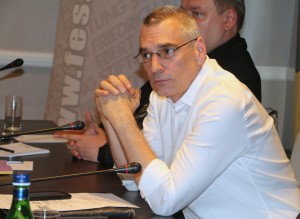 — What we see is that the lack of the strategic vision, as well as insufficient political will, resulted in situation where our countries despite shared legacy ignore the shared nature of their future in the terms of reintegration, independence strengthening, democratization, and economic development. Thus our event was designed to provide some innovative and cutting edge ideas, a brainstorming session looking for the ways to deepen our cooperation and foster greater collaboration within the region, — concluded Richard Giragosian, Director of Regional Studies Center (Yerevan, Armenia)
— What we see is that the lack of the strategic vision, as well as insufficient political will, resulted in situation where our countries despite shared legacy ignore the shared nature of their future in the terms of reintegration, independence strengthening, democratization, and economic development. Thus our event was designed to provide some innovative and cutting edge ideas, a brainstorming session looking for the ways to deepen our cooperation and foster greater collaboration within the region, — concluded Richard Giragosian, Director of Regional Studies Center (Yerevan, Armenia)



